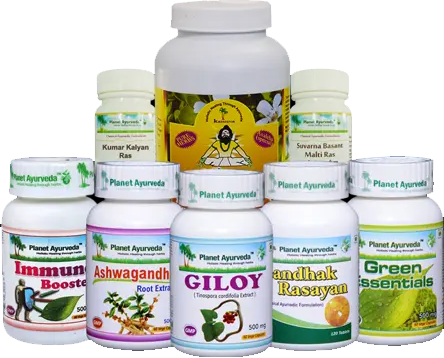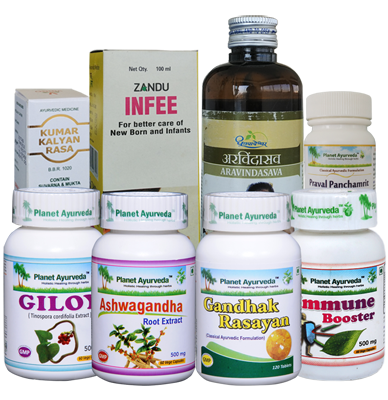How Does Ayurveda Help In Increasing Platelet Count?
ABSTRACT
Blood clotting plays an important role whenever you are injured or cut. It is the cluster of blood that converts liquid to semisolid state at the site of injury. It restricts the excess flow of blood. Platelets are main factors, responsible for Blood clotting. Platelets or Thrombocytes are the small uncolored cells whose function is to stop bleeding in the injury site by forming a plug or clot.
In this article, we will read about the platelets, their role, causes and symptoms of low platelet count, side effects of infusing platelets and how Ayurveda helps in naturally increasing the platelets count.
INTRODUCTION
Platelets are the important component of blood responsible for stopping excess blood loss at the site of injury by forming clusters of blood. Blood Platelets are generated by bone marrow (spongy center inside bones) along with other components of blood. Once Platelets are generated by bone marrow and circulated all over the body, they live in the bloodstream for 8-10 days. 1,50,000 –4,50,000 platelets per microliter of blood is the normal range or count of platelets. If platelets didn’t play its role properly, an excessive loss of blood takes place, which may further lead to death. Many kinds of diseases can occur due to abnormal platelet count and reduction in platelet count is already becoming one of the most common health problems globally. Blood platelet count reduction leads to a disease named, Thrombocytopenia. Platelet count Below 1,50,000 platelets per microliter of blood leads to this disease.
Symptoms of Thrombocytopenia or Low Platelet Count
Some common symptoms of Thrombocytopenia or Low Platelet Count are following:
- Discoloration of skin
- Excess flow of blood at the injury
- Bleeding from Nose and Gums
- Blood fragments in urine and stool
- Excess bleeding during menstruation
- Fatigue
Causes of Thrombocytopenia or Low Platelet Count
Some common cause of Thrombocytopenia or Low Platelet Count are following:
- Rise in the number of White blood cells (Leukemia) and other cancer
- IDA (Iron deficiency anemia)
- Some types of viral infections i.e. HIV, Hepatitis C, etc.
- Chemotherapy or Radiation treatment: drugs used in this treatment or therapy destroys some normal rapidly dividing cells which are responsible for the deformation of platelets.
- High Alcohol Consumption: Alcohol may impact the shape and function of platelets.

Some conditions are also there in which destruction of platelets may enhance as compared to the production of platelets. This may lead to shortage of platelets in the bloodstream.
Such conditions are following:
- Pregnancy: Anemia in pregnancy
- Some type of severe bacterial infection may lead to destruction of platelets.
- TTP (Thrombotic Thrombocytopenic purpura): Blood disorder in which Blood clots occur throughout the body. It may lead to low platelet count.
- HUS (Hemolytic Uremic Syndrome): Severe Disorder causes sharp reduction in platelet count.
- Medications: Certain medications also may cause Thrombocytopenia. For example, Sulfa containing Antibiotics, Anticonvulsants, heparin, Quinine, and many others.
PLATELET TRANSFUSION
In modern medicine, there is no specific treatment for reduction of platelets. They only go on with symptomatic treatment and end up with Platelet Transfusion. Platelet transfusion or Platelet concentrate is generally used to treat people with low platelet count or Thrombocytopenia. Transfusion increases the number of platelets in the bloodstream. Platelet Transfusion usually takes 15-30 minutes. This transfusion seems necessary for the patient having Thrombocytopenia to increase the level of platelets, but ends up with many side effects on Patient’s health.
Some of them are:
- Hemolytic transfusion reactions: These reactions are caused by blood type incompatibilities.
- Febrile nonhemolytic transfusion reaction: These transfusion reactions are associated with transfusion.
- Some Allergic reactions such as Hives, Itching, Fever.
- Septic reactions such as Tachycardia, Hypotension, Generalized pain, Multiorgan failure.
- Circulatory overload: It includes tightness in chest, cough and rapid increase in blood pressure.
- Post transfusion purpura: It includes Bleeding (Mucosal and Gastrointestinal).
- Transfusion associated graft versus host disease: It is usually rare but life threatening.
- Lung injury
LIFE SPAN OF TRANSFUSED PLATELET
Expected time period of platelets after transfusion is 3-4 days.
AYURVEDIC ASPECT WITH BETTER RESULTS
देहस्यरुधिरंमूलंरुधिरेणैवधार्यते |
तस्मादःयत्नेनसरंक्षयंरक्तंजीवइतिस्तिथिः ||
(Sushrut, Sutrasthana, 14/45)
Acharya Sushrut in this shloka has explained the importance of blood. This shloka means that blood is the basic root tissue of the body. The whole body and life is based on blood. Thus, one must protect the blood by all means as blood is considered as another name for life.
In Ayurveda, Acharya’s has mentioned various bleeding disorders under the heading of raktapitta, where Acharya Charaka has divided raktapitta in three types:
- Udharvgat Raktpitt i.e. bleeding disorders related to the upper part of the body that include epistaxis, hemoptysis, etc.
- Adhogat Raktapitta i.e. bleeding disorder related to lower body parts that include melena, blood in stool, bleeding fissure etc.
- Tiryak Gata raktapitta i.eThe thrombocytopenic conditions such as ITP where bleeding from any part of the body can occur.
Acharya Sushruta has also explained features resulting after excessive blood loss (Sushrut, Sutra, 14/31)
- Blindness
- Glaucoma
- Cataract
- Malnutrition
- Seizures
- Paraplegia
- Hemiplegia
- Cough
- Respiratory Difficulties
- Anemia
- Death
HERBAL MEDICINES BEING PROVIDED BY PLANET AYURVEDA
Planet Ayurveda provides the best combination of 100% safe and pure herbal remedies named as ITP pack (for adults) to increase the number of platelet counts and treat adults suffering from ITP. Planet Ayurveda provides standard quality medicines which are made up of the best and effective quality of herbs. These herbal medicines are free from any kind of preservative and chemicals.
Herbal formulations suggested by our experts for dealing with reduced platelet count are:

- Ashwagandha Capsules
- Brahmi Chayawanprash
- Giloy Capsules
- Gandhak Rasayan Tablets
- Green Essential Capsules
- Immune Booster Capsules
- Kumar kalyan Ras
- Suvarna Basant Malti Ras
Full Description of above enlisted Herbal Drugs:
1. Ashwagandha Capsules
It is made up of root extract of Ashwagandha (Withania Somnifera). It is well known for Balancing “Vata” in the body, Ashwagandha is one of the best immunity boosters and improves the production of white and red blood cells along with platelets as well.
Dosage: 1-2 capsules twice daily after meals, with plain water
2. Brahmi Chayawanprash
It is made up of the potential herbs’ extract including Brahmi (Bacopa monnieri) and 28 unique ingredients. Planet Ayurveda’s Brahmi chayawanprash is the herbal formulation in the form of avaleha (jam form). Tridoshas are effectively maintained with this product, also, it balances the nervous and immune system. It prevents viral infections which may be a cause for Thrombocytopenia.;
Dosage: 1 teaspoon twice daily with lukewarm milk or warm water
3. Giloy Capsules
Giloy (Tinospora cordifolia) is the herb with enormous benefits. It is also known as “Guduchi” and “Amrita” and considered as the best immunity booster. Planet Ayurveda’s Giloy capsules is the herbal formulation that contains extract of the stem of giloy. It increases the killing capability of the macrophages (which reduce the chances of infection) that leads to low platelet count. Blood vascular systems are also promoted by these capsules.
Dosage: 1 capsule twice daily with plain water, after the meals
4. Gandhak Rasayan Tablets
Planet Ayurveda’s Gandhak Rasayan tablets are formulated with pure and fully standardized quality of shuddha gandhak (purified sulphur). It pacifies tridoshas, eliminates harmful effects of toxins and improves the immune system.
Dosage: 2 tablets twice daily with normal water, after meals
5. Green Essentials Capsules
These Capsules from Planet Ayurveda are made up of the combination of Different types of green high quality, nutrient enriched herbs such as Spirulina (Spirulina Platensis), Amla (Embellica officinalis) and WheatGrass (Triticum aestivum), etc. It is a beneficial dietary supplement that helps to maintain a healthy body.
Dosage: 2 tablets twice daily after meals, with plain water
6. Immune Booster Capsules
Immune Booster Capsules of Planet Ayurveda are totally pure and vegetarian filled with the extracts of some potential and high quality herbs such as Grapeseed (Vitis vinifera), Cow Colostrum (Bovine Colostrum) and Bhumi Amla (Phyllanthus Niruri). It mainly aids in boosting the immune system and promoting a healthy digestion, respiration, along with positive effects on all the body functions.
Dosage: 2 capsules twice daily with plain water, after meals
7. Kumar Kalyan Ras
As the name specifies that it is especially formulated to be used by kumars (children). Kumar Kalyan Ras of Planet Ayurveda is prepared using different types of minerals or their ashes such as Swarna Bhasma (Ash of Gold), Loha Bhasama (Iron Ash), Makshika Bhasama (Ash of copper-iron pyrite), Shuddha Parada (Purified Mercury), Ghritkumari Rasa (Extract of Aloe Vera juice), etc. It helps to sustain the healthy cardiovascular system of the children. Also, it assists in treating the symptoms of low platelet count such as fever, etc.
Dosage: 1 twice daily with plain water, after meals.
8. Suvarna Basant Malti Ras
Planet Ayurveda’s Suvarna Basant Malti Ras is high quality herbo-mineral formulation that contains the blend some effective natural ingredients as mentioned in the nacient ayurvedic texts. The extracts of Shuddha Hingula (Cinnabar in a purified form), Marich (Piper Nigrum), Mukta Bhasma (Pearl Ash) and Nimbu Swarasa (Lemon juice) as Bhavna Dravya, etc. are mixed together in this classical formulation. It is useful to reduce Thrombocytopenia symptoms such as Fatigue, weakness, etc.
CONCLUSION
As we have clearly seen in the above article, modern medicine has no specific mode of treatment for the reduction of platelets. They give the symptomatic treatment and finally end up relying on platelet transfusion for the whole life, which keeps on causing adverse effects on life. But, Ayurveda works on the root cause, eliminates it and treats the symptoms as well, which in turn relieves the patient from this health disorder. Thus, it has a better scope for treating a patient with Thrombocytopenia. For more details, stay connected through www.planetayurveda.com.








